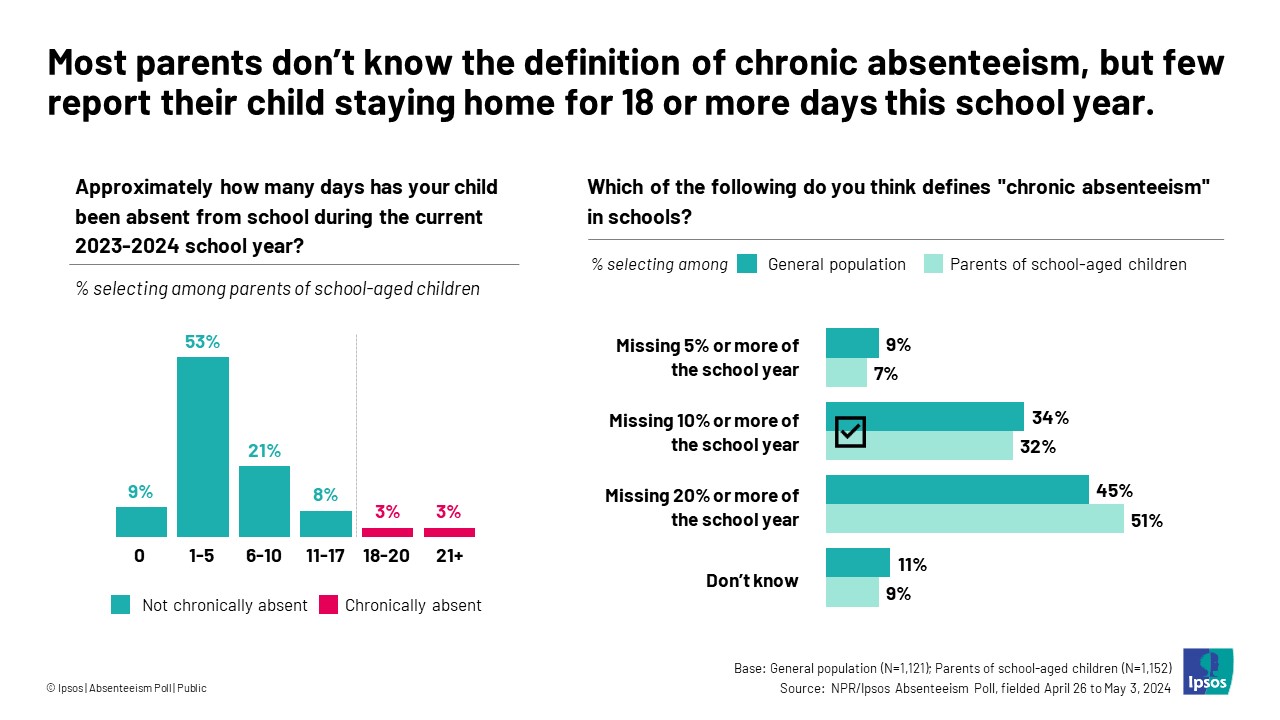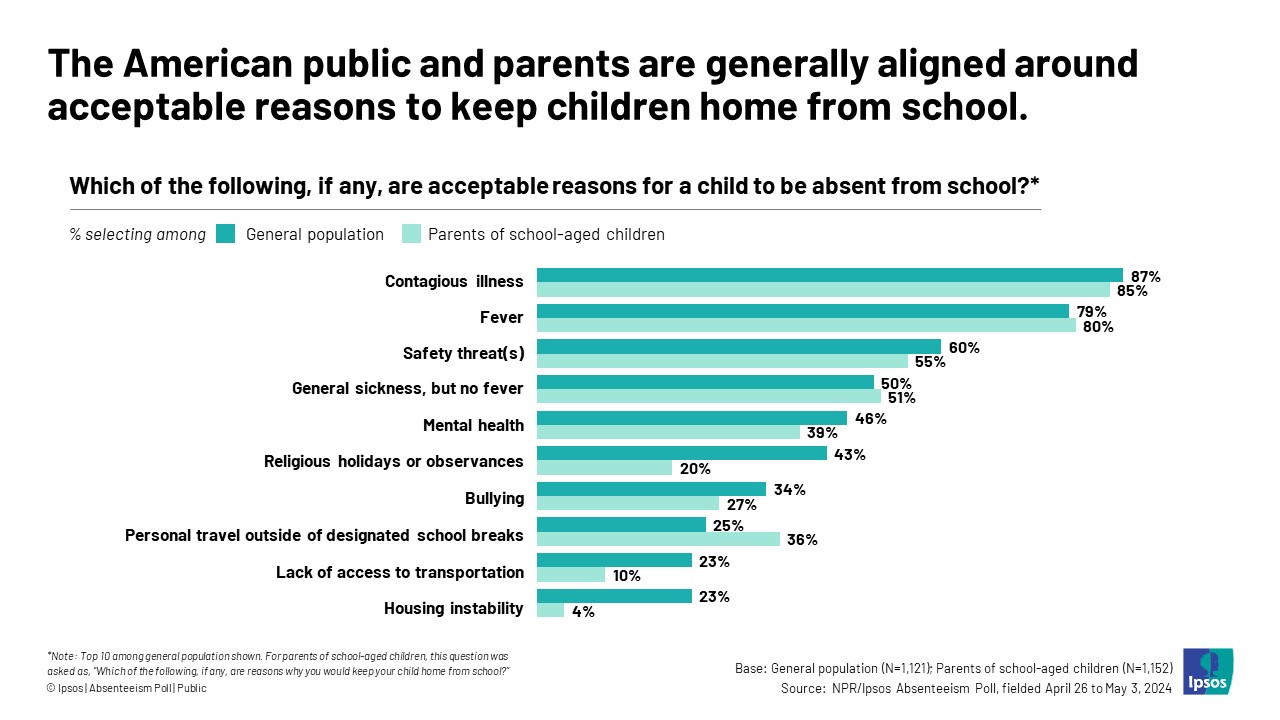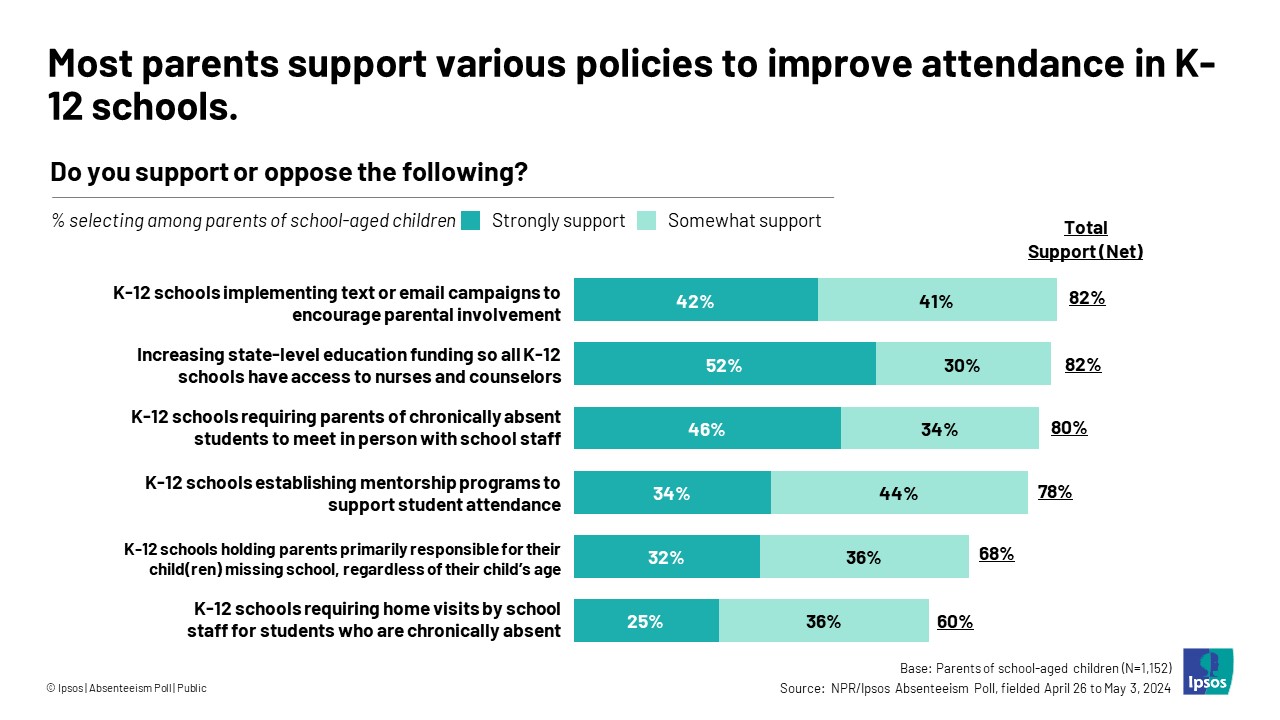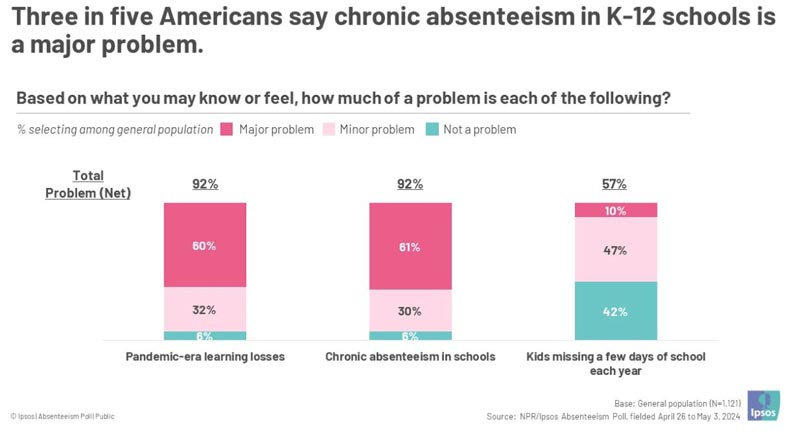New NPR/Ipsos poll finds that most Americans support schools holding parents primarily accountable for their child(ren) missing school, regardless of their child’s age
June 10, 2024 - Washington, DC – The latest NPR/Ipsos poll explores chronic absenteeism—missing 18 or more days during the school year—in K-12 schools in the United States. While chronic absenteeism isn’t top of mind for most Americans or parents*, the majority say it is a problem and that it is important for children to attend school every day. Among parents who had child(ren) in school during the 2019-2020 school year, a bare majority say their child’s school attendance policy has not changed, but nearly one-third say these policies have gotten more relaxed since before the COVID-19 pandemic. As a whole, few parents can identify the correct definition of chronic absenteeism, but the majority say they are in support of various measures to improve attendance, such as requiring in-person meetings, implementing communication campaigns, or increasing state-level education funding. Ultimately, most Americans in general, as well as parents, support K-12 schools holding parents primarily responsible for their child(ren) missing school, regardless of their child’s age.
Download Study
For more information about this study, please click here.
*Note: Data findings among parents in this study refer to parents of school-aged children in particular.
Detailed Findings:
1. Although chronic absenteeism does not rise to the top of the list of broader educational concerns, there is a sense among the public and parents that it is a big problem.
- When asked about the issues that worry them most in K-12 education, few parents (5%) say they are most worried about chronic absenteeism. Instead, a plurality (40%) says they’re most worried about young people not being prepared for the future, followed by bullying (39%) and gun violence (31%).
- However, nine in ten (92%) parents say chronic absenteeism in schools is a problem, and 56% say it is a major problem. This sentiment is consistent among parents regardless of gender, age, or child’s grade; yet, Black and Hispanic parents are more likely than white parents to say that chronic absenteeism in schools is a major problem (67% and 64% vs. 50%, respectively).
- Nearly all parents (95%) say it is important for children to attend school every day during the school year. Two-thirds (67%) of parents say it is very important. Older parents, ages 50+, are more likely than younger parents, ages 18-49, to say it is very important for children to attend school every day (77% vs. 65%, respectively).
2. While most Americans say chronic absenteeism is a problem, few know how chronic absenteeism is defined. Regardless, few parents report their child staying home for 18 or more days during the 2023-2024 school year.
- When asked how to define chronic absenteeism in schools, only one-third of Americans (34%) and parents alike (32%) can correctly identify the definition of missing 10% or more of the school year. Otherwise, a plurality of Americans (45%) and a bare majority of parents (51%) incorrectly say they think chronic absenteeism is defined as missing 20% or more of the school year.
- Lacking knowledge in defining chronic absenteeism is consistent regardless of parent age or gender. Although, white parents (38%), parents with a household income of $100k+ (40%), and parents of elementary school students (36%) are slightly more likely to define chronic absenteeism correctly when compared to their counterparts.
- Just 6% of parents say their student has missed 18 or more days of school, considered chronic absenteeism, during the 2023-2024 school year. Instead, a bare majority (53%) say their child has missed 1-5 days. Nine percent say their child has missed zero days this school year.

3. The American public and parents are generally aligned around acceptable reasons to keep children home from school. Nonetheless, a plurality of parents says they their own parents were stricter with them about missing school than they are with their own child(ren) now.
- Most parents say they would keep their child home from school for a contagious illness (85%) or fever (80%), but slightly fewer (51%) say they would keep their kid home for general sickness without a fever. Just 39% say they would keep their child home for mental health struggles. Compared to parents, the general public generally agrees on acceptable reasons for children to be kept home from school.
- Notably, though, 36% of parents say they would keep their kid out of school for personal travel. Comparably, just 25% of the general American public agrees personal travel is an acceptable reason for a child to be absent from school.
- Compared to their own parents, nearly half of parents (49%) agree that their parents were stricter with them about missing school than they are with their own child(ren). One-quarter strongly agree with this sentiment. Conversely, 43% disagree that their parents were stricter about missing school than they are with their own children.
- Hispanic and Black parents are more likely than white parents to agree their parents were stricter with them missing school than they are with their own children (59% and 58% vs. 41%, respectively). Conversely, parents who live in rural areas are more likely than those who live in suburban or urban areas to say they disagree with this sentiment (51% vs. 42% and 41%, respectively).

4. Since the COVID-19 pandemic, some parents say their school’s attendance policy is more relaxed. Moving forward, Americans and parents alike believe schools should hold parents accountable for attendance, and most support a variety of policies that aim to reduce chronic absenteeism in schools.
- Among parents who had a child in school during the 2019-2020 school year, 53% say their child’s school attendance policies have stayed the same. However, 29% say they are more relaxed, including 8% who say they are much more relaxed. About one in five (18%) say their child’s school attendance policies have gotten stricter compared to before the COVID-19 pandemic.
- Most parents—as well as Americans as a whole—support policies to reduce chronic absenteeism in schools. For example, about four in five parents support text or email campaigns to encourage parental involvement, increasing state-level funding so schools have access to nurses and counselors, or in-person meetings with parents of chronically absent students. A majority of parents, regardless of gender, age, race, or urbanicity say they support each of these policies.
- Sixty-eight percent of parents say they support K-12 schools holding parents primarily responsible for the child(ren) missing school, regardless of their child’s age. Similarly, 74% of Americans as a whole say parents should be held primarily responsible.
- Older parents, ages 50+, are more likely than those ages 18-49 to say they support K-12 schools holding parents primarily responsible for their child’s attendance (78% vs. 66%, respectively). Similarly, more parents with a household income of $100k+ (75%) say they support holding parents primarily accountable compared about three in five parents who earn less than $100k+ per year.

About the Study
This NPR/Ipsos poll was conducted April 26 to May 3, 2024 by Ipsos using the probability-based KnowledgePanel®. This poll is based on a nationally representative probability sample of 1,121 general population adults age 18 or older. The poll also includes 1,152 parents of school-aged children, meaning they have at least one child in grades K-12.
The margin of sampling error is plus or minus 3.3 percentage points for at the 95% confidence level, for results based on the entire sample of gen pop adults. The margin of sampling error takes into account the design effect, which was 1.26 for all respondents. For parents of school-aged children, the margin of sampling error is plus or minus 3.4 percentage points at the 95% confidence level, and the design effect was 1.36. The margin of sampling error is higher and varies for results based on other sub-samples. In our reporting of the findings, percentage points are rounded off to the nearest whole number. As a result, percentages in a given table column may total slightly higher or lower than 100%. In questions that permit multiple responses, columns may total substantially more than 100%, depending on the number of different responses offered by each respondent.
The survey was conducted using KnowledgePanel, the largest and most well-established online probability-based panel that is representative of the adult U.S. population. Our recruitment process employs a scientifically developed addressed-based sampling methodology using the latest Delivery Sequence File of the USPS – a database with full coverage of all delivery points in the U.S. Households invited to join the panel are randomly selected from all available households in the U.S. Persons in the sampled households are invited to join and participate in the panel. Those selected who do not already have internet access are provided a tablet and internet connection at no cost to the panel member. Those who join the panel and who are selected to participate in a survey are sent a unique password-protected log-in used to complete surveys online. As a result of our recruitment and sampling methodologies, samples from KnowledgePanel cover all households regardless of their phone or internet status and findings can be reported with a margin of sampling error and projected to the general population. KnowledgePanel members receive a per survey incentive, usually the equivalent of $1 (though for some it is $2) in points, that can be redeemed for cash or prizes. No prenotification email for this study was sent prior to field. Panelists receive a unique login to the survey and are only able to complete it one time. One reminder email was sent for this study.
The data for the gen pop sample were weighted to adjust for gender by age, race/ethnicity, education, Census region, metropolitan status, household income, parental status, and party ID. The demographic benchmarks came from the 2023 March Supplement of the Current Population Survey (CPS). The Party ID benchmarks came from the Pew’s 2023 NPORS. No trimming was used. The weighting categories were as follows:
- Gender (Male, Female) by Age (18-29, 30-49, 50-64, 65+)
- Race-Ethnicity (White/Non-Hispanic, Black/Non-Hispanic, Other/Non-Hispanic, Hispanic, 2+ Races/Non-Hispanic)
- Education (Less than High School, High School, Some College, Bachelor or Higher)
- Census Region (Northeast, Midwest, South, and West)
- Metropolitan Status (Metro, Non-Metro)
- Household Income (Under $25K, $25K-$49,999, $50K-$74,999, $75K-$99,999, $100K-$149,999, $150K and Over)
- Parental Status (Parent of 0-18 years old, Not parent of 0-18 years old)
- Party ID (Republican, Lean Republican, Independent/Something else/Refused, Lean Democrat, Democrat)
To calculate the weights for parents of school-aged children, we first weighted the respondents who confirmed that they were parents of 0- to 18-year-old children. The larger set was weighted to adjust for gender by age, race/ethnicity, education, Census region, metropolitan status, household income, parental status, and party ID to look like the population of parents with at least one child 0 to 18 years old. The demographic benchmarks came from the 2023 March Supplement of the Current Population Survey (CPS). The benchmark for parents of school age children and Party ID came from the weighted main sample. The parent weights were trimmed, then subset to the eligible respondents (i.e., parents of school-aged children), and scaled to sum the unweighted sample size of parents of school age children (n=1152).The weighting categories were as follows:
- Gender (Male, Female) by Age (18-29, 30-49, 50-64, 65+)
- Race-Ethnicity (White/Non-Hispanic, Black/Non-Hispanic, Other/Non-Hispanic, Hispanic, 2+ Races/Non-Hispanic)
- Education (Less than High School, High School, Some College, Bachelor or Higher)
- Census Region (Northeast, Midwest, South, and West)
- Metropolitan Status (Metro, Non-Metro)
- Household Income (Under $25K, $25K-$49,999, $50K-$74,999, $75K-$99,999, $100K-$149,999, $150K and Over)
- Parental Status (Parent of school-aged children, Not parent of school-aged children)
- Party ID (Republican, Lean Republican, Independent/Something else/Refused, Lean Democrat, Democrat)
About Ipsos
Ipsos is one of the largest market research and polling companies globally, operating in 90 markets and employing over 18,000 people.
Our passionately curious research professionals, analysts and scientists have built unique multi-specialist capabilities that provide true understanding and powerful insights into the actions, opinions and motivations of citizens, consumers, patients, customers or employees. Our 75 solutions are based on primary data from our surveys, social media monitoring, and qualitative or observational techniques.
Our tagline "Game Changers" sums up our ambition to help our 5,000 customers move confidently through a rapidly changing world.
Founded in France in 1975, Ipsos has been listed on the Euronext Paris since July 1, 1999. The company is part of the SBF 120 and Mid-60 indices and is eligible for the Deferred Settlement Service (SRD).
ISIN code FR0000073298, Reuters ISOS.PA, Bloomberg IPS:FP www.ipsos.com
Source: Ipsos









